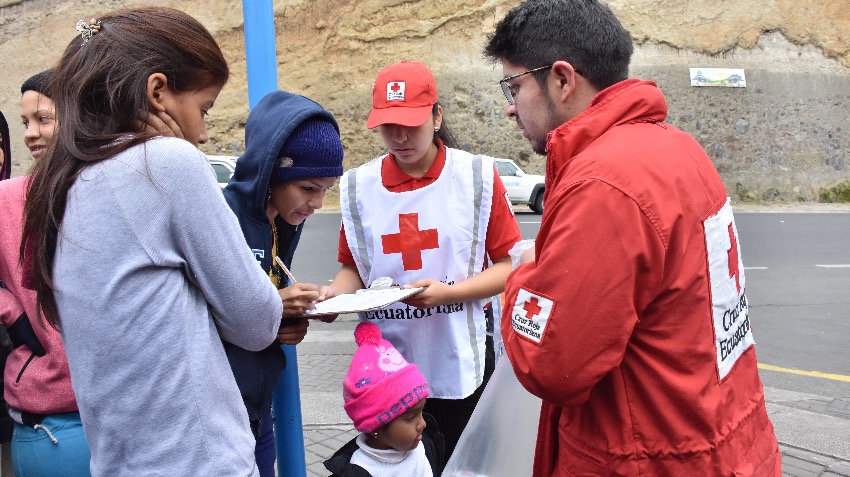Red Cross steps up support to Venezuelan migrants

Panama City / Ottawa / Geneva, 15 June 2021 – To respond to the unmet needs of Venezuelan migrants, including refugees, living in Latin America and the Caribbean, the Red Cross Red Crescent Movement is strengthening its response to provide protection and assistance to Venezuelans and host communities in 17 American countries over 36 months.
The new migration programmes – totaling 236 million CHF ($264 million) – will address short-, medium- and long-term needs and support vulnerable Venezuelan migrants, including refugees, to access healthcare, psychosocial support, income opportunities, protection services and foster social inclusion into host communities.
Since 2018, more than 5 million Venezuelans have left their country. Many of them are still not meeting their basic needs. The current pandemic and COVID-19-related lockdowns and border closures have further deteriorated an already precarious situation for many migrants, including refugees, who have lost income opportunities, faced increased discrimination, and encountered endless obstacles that prevented them from accessing basic services and protection.

Francesco Rocca, President of the International Federation of Red Cross and Red Crescent Societies (IFRC), said:
“Today, the basic needs of vulnerable Venezuelan refugees and migrants remain unmet. Many of them are still unable to access food, water and sanitation, housing, and first aid. In addition, they are now facing significant challenges in accessing healthcare, including COVID-19 vaccinations, psychosocial support, and formal or informal jobs.
“Ahead of the International Donors' Conference in Solidarity with Venezuelan Refugees and Migrants, which will take place later this week, we call on governments, donors, international organizations and civil society to step up efforts to ensure that no refugee or migrant is left behind. Action is needed now.”
The situation is particularly severe for vulnerable groups, such as migrants, including refugees, without a recognized regular status, those transiting in areas affected by armed conflict or held in immigration detention, as well as women, children, elderly people, the LGBTIQ community and people living with disabilities, who are exposed to violence, social and cultural barriers, economic exclusion, and xenophobia.
In response to the massive population movement of Venezuelans across borders, more than 6,900 Red Cross volunteers and staff have been mobilized in the Americas since 2017 and will continue to work in coordination with local, national and international stakeholders, as well as with refugees and migrants themselves, to ensure that everyone is safe and treated with dignity.

The President of the International Committee of the Red Cross (ICRC), Peter Maurer, said:
“No one should be left unprotected and alone when in need of help. Migration policies must always be guided by humanity and dignity, and in line with international obligations.
“Countless numbers of people go missing along the migration path, creating enormous distress for families who are left waiting for answers. States should take all feasible measures to prevent family separation and the risk of migrants going missing or dying. And finally - detention is not a solution to migration challenges. Detention for immigration-related reasons is a last resort. Children should never be detained.”
The Americas migration programmes still require funding and will also address environmental sustainability and climate change adaptation and mitigation, as the climate crisis in the region may also affect migrants.
The exodus of migrants, including refugees, from Venezuela continues to be the biggest population movement in Latin America’s recent history and one of the largest displacements in the world.
The 17 countries included in the Red Cross response are: Argentina, Bolivia, Brazil, Chile, Colombia, Costa Rica, Curaçao, Dominican Republic, Ecuador, Guyana, Mexico, Panama, Paraguay, Peru, Trinidad and Tobago, Uruguay and Venezuela.
For more information, contact:
IFRC
Susana Arroyo Barrantes, + 506 8416 1771, susana.arroyo@ifrc.org
Nathalie Perroud, +41 79 538 14 71, nathalie.perroud@ifrc.org
Tommaso Della Longa, +41 79 708 43 67, tommaso.dellalonga@ifrc.org
ICRC
Jason Straziuso +41 79 949 35 12, jstraziuso@icrc.org
About IFRC
IFRC is the world’s largest humanitarian network, comprising 192 National Red Cross and Red Crescent Societies working to save lives and promote dignity around the world. www.ifrc.org - Facebook - Twitter - YouTube
About ICRC
Established in 1863, the ICRC operates worldwide, helping people affected by conflict and armed violence and promoting the laws that protect victims of war. An independent and neutral organization, its mandate stems essentially from the Geneva Conventions of 1949. www.icrc.org - Facebook - Twitter - YouTube
For media inquiries, please contact Eva Oyón on: eva.oyon@redcross.eu or +32 2 235 09 22

